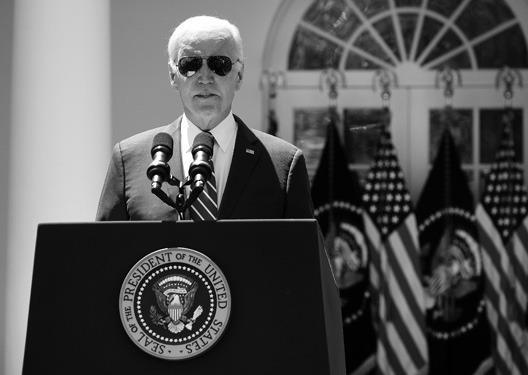Pittsburgh synagogue shooting cited as Biden releases plan to fight antisemitism
(TNS) WASHINGTON — Alarmed by an increase in antisemitic incidents, including the murder of 11 Pittsburgh worshippers in 2018, President Joe Biden and members of his administration on Thursday released a plan to combat the growing number of attacks on Jews.
“We must say clearly and forcefully that antisemitism and all forms of hate and violence have no place in America,” Mr. Biden said. “Silence is complicity. I will not remain silent. You shouldn’t either.”
The U.S. National Strategy to Counter Antisemitism would mobilize federal and state officials, educational institutions, community and religious organizations, and the private sector to talk about the contributions of Jewish Americans, teach about the Holocaust, and come together to speak out against antisemitism and other hate.
The release of the 60-page document came as jury selection concluded in the trial of Robert Bowers, accused of gunning down 11 people at a Squirrel Hill synagogue housing three different congregations on Oct. 27, 2018.
The Pittsburgh shooting “was a turning point” in acknowledging the need to fight antisemitism, said Ambassador Deborah Lipstadt, an administration special envoy to monitor and combat antisemitism.
“If they talk about specific events, no one leaves out Pittsburgh,” Ms. Lipstadt said in an interview after the strategy was announced. “It shocked us all. It was a tragic pivotal moment in American Jewish history, which brought to light in an extreme way what hatred can do and the dangers that we face.”
“This was shockingly real,” she added. “You cannot overemphasize how important it was.”
The centerpiece of the report is a series of specific actions to stop the spread of antisemitism, including increasing education about antisemitism and the Holocaust, highlighting the contributions of Jewish Americans, urging officials to speak out, adding antisemitism awareness and religious accommodations to diversity programs, and holding sports leagues accountable for athletes who make antisemitic comments.
The report calls on not just the federal government but states, community groups, educational institutions, and private businesses to take those steps.
“Antisemitism is a threat to Jewish communities and all Americans, and it can only be combated with united efforts,” said Second Gentleman Douglas Emhoff, who is Jewish. “It’s on all of us to put an end to the visceral hate that we are seeing across our nation. We cannot normalize this.”
In Pennsylvania, Gov. Josh Shapiro welcomed the report.
The Pittsburgh synagogue where Robert Bowers is accused of killing 11 worshippers in 2018, the worst antisemitic attack in American history.
“I was sworn in on a Bible from the Tree of Life Synagogue – the site of the deadliest act of antisemitism in US history,” he tweeted. “That moment shows that progress is possible in this country.”
The recommendations also include changing federal law to make social media companies responsible for the antisemitic and other bigoted comments posted on their platforms. “Antisemitic comments, tropes, and conspiracies are rampant on social media platforms, and there is too little accountability for those who peddle and amplify them,” the report said.
And the report calls for more federal aid to protect synagogues and other Jewish institutions. Homeland Security Advisor Liz Sherwood-Randall said the administration is asking Congress for $360 million in security grants, double the amount from just two years earlier.
The Pittsburgh shooting, the deadliest antisemitic attack in American history, accelerated the demand for protection.
“It changed the daily lives of American Jews,” Ms. Lipstadt said. “Any Jewish institution that didn’t have enhanced security before Pittsburgh certainly had it afterward.”
Rabbi Jeffrey Myers of the Tree of Life Congregation, who survived the shooting, welcomed the plan but called it a “bittersweet moment.”
“I am proud that our leaders understand the urgency and importance of countering antisemitism in a comprehensive way, but grieve the levels of antisemitism in the country that required the need for a plan in the first place,” he said.
As part of the national strategy, the Departments of Justice and Homeland Security will reach out to Jewish communities to make sure they are getting the grants and other help they are entitled to, Ms. Sherwood-Randall said.
“Jewish Americans must feel safe walking to synagogue on a Saturday morning, wearing a kippah in public or gathering for Shabbat on college campuses,” Ms. Sherwood-Randall said.
The report endorsed the International Holocaust Remembrance Alliance definition of antisemitism, which includes accusing Jews of being more loyal to Israel than their home countries, denying them the right of self-determination by calling Israel “a racist endeavor,” and demanding Israel alone among the world’s democratic nations follow certain behaviors.
The American Jewish Congress said in a statement that the IHRA definition “remains the most clear, comprehensive, and broadly accepted definition of antisemitism to date, and it should serve as the foundational tool in the implementation of the strategy and its priorities.”
But the report also “welcomes and appreciates” the so-called Nexus Document, which says one can criticize Israeli policy or even the establishment of the Jewish state without automatically being labeled antisemitic.
The Republican Jewish Coalition criticized Mr. Biden for that position, saying the alternative definition “says applying double standards and singling out the Jewish state for criticism is not antisemitic.”
“Joe Biden had a chance to take a strong stand against antisemitism and he blew it,” Matt Brooks, who heads the RJC, said in a statement The Anti-Defamation League, which researches and opposes antisemitism, reported a record 3,697 antisemitic incidents last year, up 36% from 2021. That included 114 in Pennsylvania, also the highest ever reported and a 63% increase compared to 2021.
“As the U.S. Jewish community is experiencing antisemitism at levels not seen in generations,” CEO Jonathan Greenblatt said in a statement, “we deeply appreciate that the White House has stepped up and delivered this significant, comprehensive strategy.”

